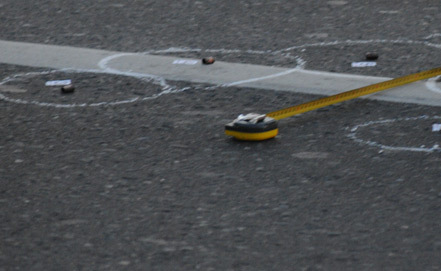
Russian Diplomat’s Murder in Abkhazia Has Powerful Implications for Russian-Georgian Relations
Publication: Eurasia Daily Monitor Volume: 10 Issue: 172
By:

On September 9, Russian diplomat Dmitry Vishernev was killed in Sukhumi, the capital of the breakaway Georgian region of Abkhazia, which Moscow has “recognized” as independent along with South Ossetia following Russia’s brief August 2008 war with Georgia. Vishernev was first secretary at the Russian embassy there (www.abkhazia.mid.ru/index.html). The official was shot in the head next to the garage of his home in Sukhumi (https://apsnypress.info/news/9966.html). His wife, Olga, was wounded in the attack, and died of her injuries in the hospital a week later, on September 15 (https://ria.ru/incidents/20130914/963209638.html).
According to eyewitnesses, the attacker attempted to escape by taxi, but because of an argument with the taxi drivers was forced to leave the crime scene on a trolley bus (https://www.yuga.ru/news/306587/). Thus, it appears the killer planned his crime without any concern for his escape, and was able to calmly leave the scene using public transportation. An improvised explosive device (IED) that apparently did not explode was found at the crime scene, suggesting the killer was forced to use his gun to murder the victim (https://rbcdaily.ru/society/562949988963653).
Russian officials did not let such a high-profile crime be investigated by their Abkhazian colleagues. Moscow sent in its own investigative team, which was to determine the circumstances of and motive for the crime (www.iarex.ru/news/41057.html).
The initial theory for the Russian diplomat’s murder was that it was connected to his professional activities (https://ria.ru/world/20130912/962764855.html). Other theories also abounded—including a personal conflict, given that the victim and the killer lived in the same apartment block. Another theory was connected to the diplomat’s real estate acquisitions in Abkhazia (https://newsru.com/world/20sep2013/diplomat.html).
By September 12, investigators were convinced that the perpetrator had left Abkhazia either for another part of Georgia or Russia. The arrest of a Chechen, Yusup Lakaev, in the Georgian port city of Batumi raised suspicions that he was the murderer. Lakaev fired at police when they tried to arrest him in Georgia (www.apsny.ge/2013/mil/1379218680.php). The country’s counter-terrorism officials said they had information that a Russian citizen from the North Caucasus had illegally crossed the Georgian border and stayed at the home of a Batumi resident.
The investigators determined that in 2010, Lakaev was prosecuted in Russia for supplying food to the leader of the armed resistance in Chechnya’s Achkhoi-Martan district, Emir Umar Isaev (www.ekhokavkaza.com/archive/news/20130920/3235/2759.html?id=25112555). Lakaev was sentenced to a prison term for that crime, but did not spend much time behind bars. Still, the suspect ended up on the Russian government’s list of individuals and organizations that pose a special danger to next year’s Winter Olympics in Sochi. Lakaev’s is the 48th name on the list of 90 individuals (www.vz.ru/news/2013/9/20/651257.html).
The photograph of the suspect, which was circulated by the police in Sukhumi, shows a beardless young man with light-brown hair (https://informing.ru/2013/09/12/skr-vozbudil-delo-po-faktu-ubiystva-rossiyskogo-diplomata-v-abhazii.html)—hardly a person who looks like a Chechen. Another interesting question is how Lakaev managed to travel to Abkhazia given that he was on the list of dangerous individuals. Why was no one interested in his intentions during the month he was living in Sukhumi, given his prison record for involvement in the armed underground? Why did the suspected killer live in the same apartment building as the victim, thereby allowing the police to detect him easily? Why did the Abkhazian security services not take action when a Chechen moved into the same block of apartments as the first secretary of the Russian Embassy? Abkhazia is a small place, occupying only 8,600 square kilometers, more than half of which are mountains.
The assistance of Georgian law enforcement in the investigation of the murder of the Russian diplomat, and its concurrence with the Russian allegations that it was linked to the North Caucasian armed underground, raise bilateral Russian-Georgian relations to a new level (https://www.apsny.ge/2013/mil/1379374470.php). This impression of warming relations is further bolstered by the unexpected trip that Georgian Prosecutor General Archil Kbilashvili made to Russia on September 20 (www.ekhokavkaza.com/archive/news/20130920/3235/2759.html?id=25112108).
Kbilashvili said he made his four-day-long trip to Russia in order to participate in an international conference. But it is unlikely that the Georgian prosecutor general visited the Russian Federation, a country that Georgia has no diplomatic relations with since 2008, simply for that reason. According to media reports, Yusup Lakaev may be extradited if Russia asks. It is strange that Georgia offered to extradite the individual suspected in the murder of the Russian diplomat even before Russia requested it (https://kavpolit.com/gruziya-gotova-rassmotret-zapros-rf-ob-ekstradicii-lakaeva/). Georgian prosecutors are not yet ready to say whether or not the suspect will be handed over to Russian authorities (https://www.ekhokavkaza.com/archive/news/20130920/3235/2759.html?id=25112713). Apparently, Georgia is testing the reaction of various circles to Lakaev’s possible extradition to Russia.
The murder in Abkhazia may be used as a pretext for rapprochement between Russian and Georgia. At the very least, Vladislav Surkov, who was recently appointed an assistant to the Russian president (www.kremlin.ru/news/19254), will have something to start with. This past May, Surkov unexpectedly resigned from the more influential position he held as Russian deputy prime minister and head of the government’s administration (https://top.rbc.ru/politics/13/05/2013/857207.shtml; see EDM, May 23).
Surkov suddenly agreed to take a job focusing on a much smaller area—Abkhazia and South Ossetia. The question is why did Surkov consent to assume a position of such comparably insignificant political power? Are there more important issues at stake, such as Georgia and all of the South Caucasus? The problem for Russia is that despite the ascension to power in Georgia of Prime Minister Bidzina Ivanishvili, the process of Georgia’s alignment with Europe has not only not stopped, but even accelerated. Indeed, Georgia has clear prospects for signing an Association Agreement with the European Union soon (www.apsny.ge/2013/pol/1379794749.php). Russia managed to divert Armenia from this path at the last minute (https://news.am/rus/news/169603.html), however, which leads Moscow to believe that Georgia has not been lost completely.
Russia has appointed the most competent official publicly known for overseeing the direction of the country’s southern policy, which will arguably cause problems for Russia’s opponents in the Caucasus. Nevertheless, with Surkov in charge of relations with Abkhazia and South Ossetia, Moscow seems to have decided to bolster its use of Georgia’s breakaway territories to put ever greater pressure on Tbilisi.




